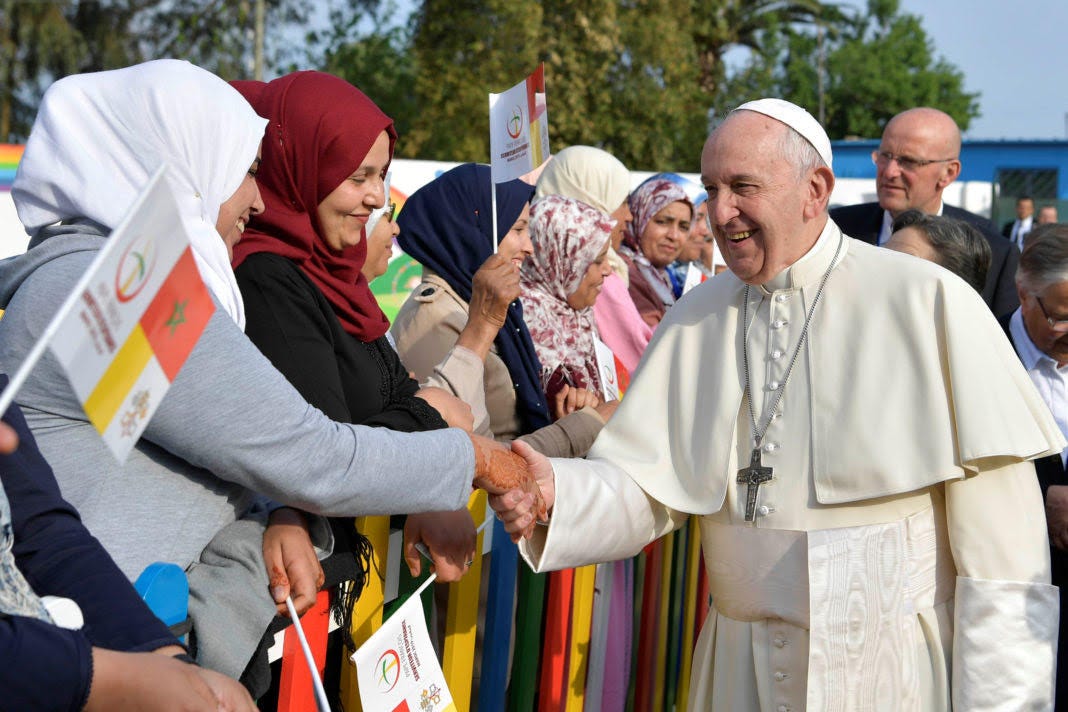Pope Francis and Islam: Looking back on the last decade
What can we learn from Pope Francis' commitment to Muslim-Christian dialogue?

On March 13, Pope Francis will mark a decade as pope. That day, ten years ago, was an exciting one for many Catholics, including me. Not only was our new pope a Jesuit—from the order of priests whose spirituality has affected me so deeply—but he had also chosen the name Francis, after the saint from Assisi who, amid the crusades in the 1200s, sought peace with Muslims and ultimately found himself transformed. At the time, I had hoped that the new pope’s name choice signaled a commitment to engaging Muslims, but I did not expect what would follow.
As I write in a new piece for America Magazine, dialogue with Muslims became an early priority of Francis’ papacy and it remains one of the most important aspects of his legacy. As someone who has devoted much of my time and energy to Muslim-Christian relations, I have found Francis’ emphasis on this to be deeply affirming of my own vocation and validating of my efforts, and I have learned much from his approach. Were it not for Francis, I’m not sure if I would still be doing this work, and I’m not convinced I would have remained as tied to the institutional church as I currently am.
So, for this ten-year anniversary, I wanted to look back on the pope’s commitment to Muslim-Christian dialogue and share some of the profound lessons that emerge from it. You can read the full piece here and I’ve shared a few excerpts and related photos below.
5 lessons from Pope Francis’ commitment to Muslim-Catholic dialogue
Pope Francis has put into practice the Church’s teaching—affirmed at the Second Vatican Council and echoed in the Catechism—that Muslims “together with us, adore the One, Merciful God.” Though there are certainly doctrinal differences between what Christians and Muslims profess about God, this does not preclude us from acknowledging the similarities we do have or from coming together (along with Jews and even others) to praise and petition our common God.
Both encyclicals show how Francis—and indeed the entire Catholic Church—has been positively shaped by Muslims and the wisdom expressed through their faith tradition. They also demonstrate that the boundaries between our religious communities are more porous than we often realize. The history of the Catholic Church—including its formal teaching—has been shaped by active Muslim participation.
When it comes to condemning religious bigotry and persecution, Pope Francis displays a moral consistency that is rare among world leaders. Just as he speaks up for Christians facing persecution, he also advocates on behalf of Muslims in the face of Islamophobia. His principled stance sends an important message to many corners of the Church, particularly in the United States, where concern about the persecution of Christians is often prioritized while the persecution of Muslims—both at home or abroad—is often ignored.
To read more, visit America Magazine.
In the spirit of ‘digging our well,’ feel free to share your comments and reflections below.






Hi Dr. Duffner - really enjoyed reading about this, as I have been impressed by Pope Francis' work specifically as a head of state/communicator on the world stage, but really don't have a lot of knowledge on this topic specifically. Looking forward to learning more!